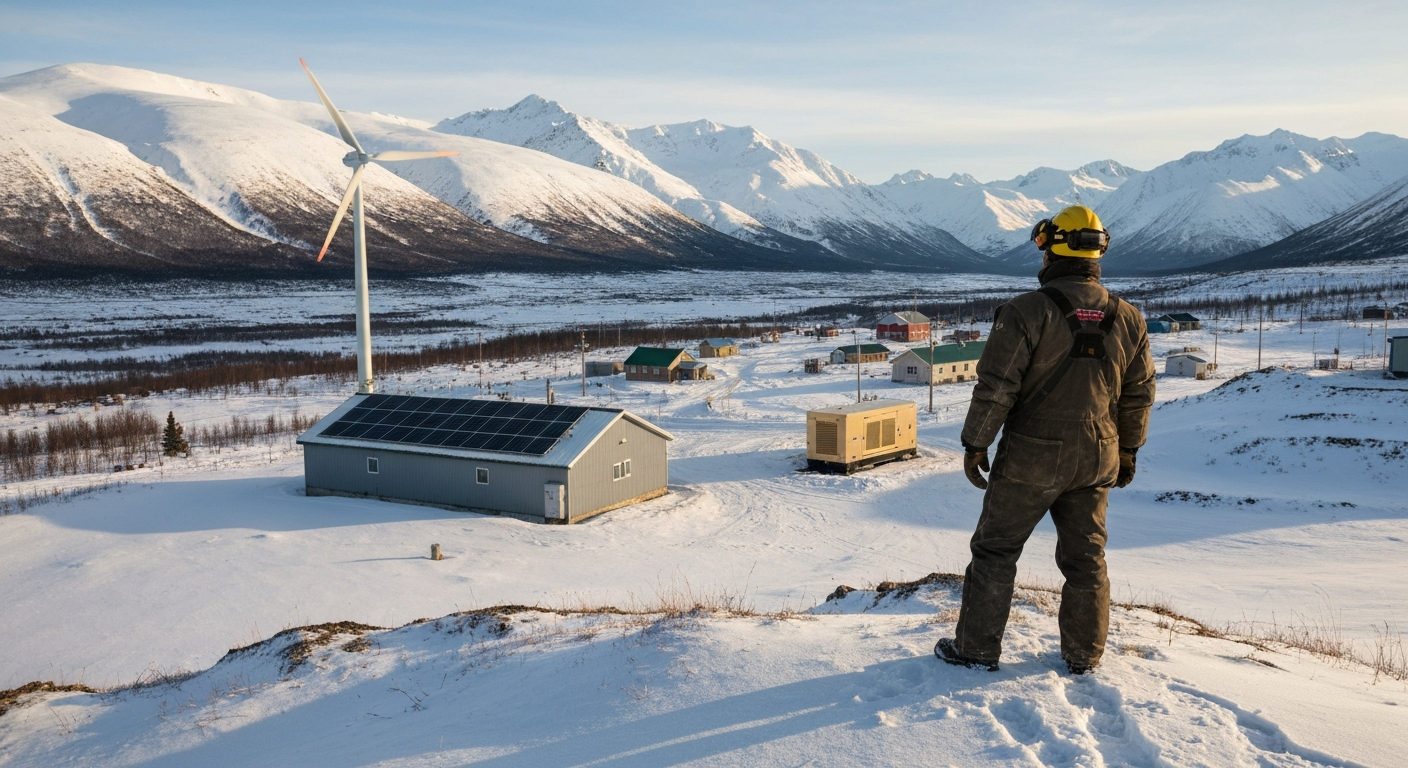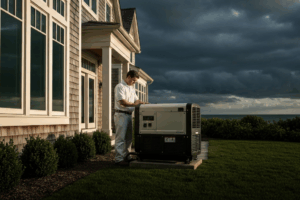
Unique Electrical Challenges and Opportunities in Alaska
The Frozen Ground Problem: Grounding in Permafrost
One of the most fundamental concepts in electrical safety is proper grounding. But what happens when the “earth” in “grounding to earth” is frozen solid for most of the year? This is the core challenge of Permafrost grounding. The electrical resistivity of frozen soil can be thousands of times higher than that of unfrozen soil, making it incredibly difficult to achieve the low-impedance path to ground required by the National Electrical Code (NEC). When soil freezes, the water within it turns to ice, which is a poor conductor, drastically increasing resistance.
To overcome this, Alaskan electricians employ specialized techniques. Standard ground rods are often ineffective. Instead, more elaborate grounding grids or rings are installed, sometimes buried much deeper to reach below the seasonal frost line. In particularly challenging areas, a method involving a continuous ground braid—a flat, woven conductor with a large surface area—may be used to make sufficient contact with the soil. These installations require a deep understanding of soil conditions and often involve methods rarely seen in more temperate climates, as outlined in NEC Article 250 which details requirements for grounding and bonding.
Powering the Unreachable: Remote Microgrids and Off-Grid Systems
Imagine being the sole electrical expert for a town only accessible by boat or small plane. This is the reality for many electricians working in the vast expanse of Alaska. With so many communities operating independently of the main “Railbelt” grid, off-grid electrical systems are the norm, not the exception. For decades, this has meant a heavy reliance on diesel generators.
Consequently, expert-level diesel generator maintenance is a critical and highly sought-after skill. However, the high cost of fuel, coupled with complex remote village logistics for delivery, has fueled a powerful shift toward more sustainable solutions. This is where remote microgrids are changing the game. These small, self-contained power networks are increasingly being built as hybrid power systems, combining traditional diesel generators with renewable sources like wind and solar.
The transition to these advanced systems creates a huge opportunity for electricians skilled in microgrid renewable integration. This involves not just wiring panels and turbines, but understanding the complex control systems, battery storage units, and inverters that make these hybrid grids work. To help offset the incredibly high cost of power in these areas, the state administers the Power Cost Equalization (PCE) program, which provides subsidies to rural utilities to lower electricity bills for residents and community facilities. This program is vital for the economic survival of these remote communities and helps make the investment in modern microgrids more feasible.
The Alaskan Code: Adapting to Sub-Zero Realities
Working in temperatures that can plummet to -50°F or below means that standard materials and practices often don’t apply. Wire insulation becomes brittle, enclosures crack, and even the simple act of stripping a wire becomes a challenge. This has led to several Alaska-specific NEC amendments that address these cold-weather challenges. The Alaska Department of Labor and Workforce Development is authorized to adopt the National Electrical Code with amendments to constitute the minimum electrical safety standards for the state.
Specialized materials are essential for safe and durable installations:
- Arctic ultraflex blue wire is a prime example. This type of wire is engineered with a special thermoplastic elastomer (TPE) jacket that remains flexible and workable in temperatures down to -55°C (-67°F), preventing the cracking and damage that would destroy standard PVC-coated wire.
- Cold climate heat trace becomes a necessity for preventing pipes, gutters, and even critical equipment from freezing and bursting. Installing and maintaining these systems is a common task for electricians in the state.
- All exterior components must be built to withstand the elements. This means an absolute reliance on high-quality, industrial-grade weatherproof outlets and enclosures designed to keep out moisture, ice, and corrosive salt spray in coastal areas.
- Safety is paramount, especially with the constant presence of melting snow and ice. The use of Class A GFCI protection is critically important in many applications to protect against severe electrical shock in these uniquely hazardous, wet conditions.
The Opportunity: A Grid in Transition and a Market in Demand
While the challenges are significant, the opportunities for skilled electricians in Alaska are immense. The state is in the midst of a major energy transition, with significant investments being made to modernize the grid and integrate renewable energy sources. This creates a robust demand for electricians that is expected to continue for years to come. In fact, the average salary for electricians in Alaska is often higher than the national average, reflecting the high demand and specialized skills required. It’s no surprise that Alaska often ranks among the top-paying states for electricians.
This dynamic environment is creating new career paths. The growth of microgrids and renewable projects offers exciting work for those at the cutting edge of technology. For entrepreneurial electricians, the unique needs of the state provide a chance to build a specialized business. If you’re considering starting an electrical business in Alaska, focusing on a niche like generator maintenance or renewable integration could be a powerful strategy. The job market for Alaskan electricians is ripe with potential for those willing to embrace the challenges.
Whether you are looking to become an electrical contractor or advance your career, the Last Frontier offers a unique and rewarding path. The combination of high-stakes problem-solving, cutting-edge technology, and the rugged beauty of the landscape makes electrical work in Alaska a truly unparalleled experience. For those with the right skills and adventurous spirit, there is no better place to build a career.
To ensure you have the latest knowledge on code and safety, it’s crucial to stay current with your continuing education. Ready to power your career? Browse our courses to find state-approved training relevant to your needs.
Related Resources
Alaska Continuing Education Courses
Explore our board-approved continuing education courses for Alaska professionals:
View CE RequirementsAlaska 2023 NEC (Ch 1-4), 8 hours Electrical Administrators License Renewal Package
Alaska 2023 NEC (Ch 4-7), 8 hours Electrical Administrators License Renewal Package
Alaska 2023 NEC 16 Hr Electrical License Renewal Package
Disclaimer: The information provided in this educational content has been prepared with care to reflect current regulatory requirements for continuing education. However, licensing rules and regulations can vary by state and are subject to change. While we strive for accuracy, ExpertCE cannot guarantee that all details are complete or up to date at the time of reading. For the most current and authoritative information, always refer directly to your state’s official licensing board or regulatory agency.






